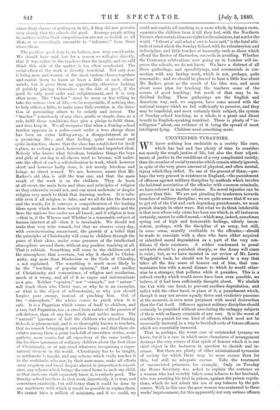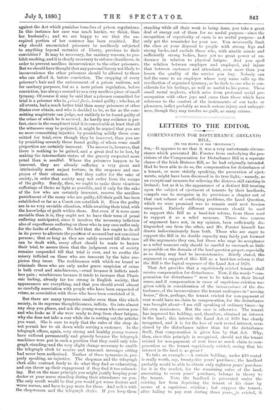UNINTENDED TYRANNIES.
1VE know nothing less creditable to a society like ours, which has had and has plenty of time to consider, not merely the rough justice of life, but also the finer adjust- ments of justice to the conditions of a very complicated society, than the number of social tyrannies which remain utterly ignored, in spite of the very grave amount of physical, and often mental, injury which they inffict. To one of the gravest of these,—per- haps the very gravest in existence in England,—the punishment of offences against military discipline by methods which involve the habitual association of the offender with common criminals, we have referred in another column. No moral injustice can be grosser than this. We are not pleading for tenderness towards breaches of military discipline ; we are quite aware that if we are to get rid of the Cat and such degrading punishments, we must punish sharply in other ways. But what we do think intolerable is that men whose only crime has been one which, in all instances certainly, cannot be called moral,—which may, indeed, sometimes spring out of high and honourable feelings, utterly incon- sistent, perhaps, with the discipline of an army, but still, in some sense, morally creditable to the offender,—should be made to associate with a class who have either acquired or inherited moral degradation as a part of the very con- ditions of their existence. A soldier condemned to penal servitude should be punished sharply, or the Army will cease to exist ; but, as we have insisted in our review of Mr. Lewis Wingfield's book, he should not be punished in a way that takes all the fine sense of honour out of him, that con- taminates him with a moral disease to which he would other- wise be a stranger, that pollutes while it punishes. This is a refined cruelty which would never have been even possible, we believe, if it had been sufficiently thought about. We abolish the Cat with one hand, to prevent needless degradation, and inflict with the other hand, in place of it, a punishment which, though it may not arouse equally fierce and vindictive passions at the moment, is even more pregnant with moral destruction than the Cat itself. Offences against military discipline should certainly be punished without associating the unhappy subjects of them with ordinary criminals of any sort. It is the worst of cruelties to punish for one kind of offence, which need not be necessarily immoral, in a way to breed all sorts of facture offences which are essentially immoral.
That is, perhaps, the worst case of unintended tyranny we know, for it is a case in which mere clumsiness of arrangement destroys the very source of that spirit of honour which it is our chief object in the instances in question to cherish and in- crease. But there are plenty of other unintentional tyrannies of society for which there may be more excuse than for this, but still no adequate excuse. Take the treatment of unconvicted prisoners, for example. Only on Tuesday the Home Secretary was asked to explain the sentence on a woman who had secretly taken some tobacco to her husband, who was awaiting his trial in prison, against the prison regula- tions, which do not admit the use of any tobacco by the pri- soners. Well, in this case the poor woman was sentenced to three weeks' imprisonment, for this apparently not very serious offence against the Act which punishes breaches of prison regulations. In this instance her case was much harder, we think, than her husband's ; and we are happy to see that the un- expired portion of her sentence has been remitted. But why should unconvicted prisoners be needlessly subjected to anything beyond restraint of liberty, previous to their conviction ? It may be necessary, for sanitary reasons, to pro- hibit smoking, and it is clearly necessary to enforce cleanliness, in order to prevent needless inconvenience to the other prisoners. But we should have thought that any personal luxury not likely to inconvenience the other prisoners should be allowed to those who can afford it, before conviction. The cropping of every prisoner's hair and the enforcement of a prison uniform, not for sanitary purposes, but as a mere prison regulation, before conviction, has always seemed to us a very needless piece of small tyranny. Of course it may be said that a prisoner committed for trial is a prisoner who is, prilla facie, found guilty ; who has, at all events, had a much better trial than many prisoners of other States ever obtain, and who is decided to be, so far as the com- mitting magistrate can judge, not unlikely to be found guilty of the crime of which he is accused. As hardly any evidence is per- fect, since in the completest trial it is conceivable at least that all the witnesses may be perjured, it might be argued that you are no more committing injustice by punishing mildly those com- mitted for trial, even though they be innocent, than you are by punishing severely those found guilty, of whom some small proportion are certainly innocent. The answer is, however, that there is nothing to be gained, and a great deal to be lost, by making the intermediate status of the gravely suspected more penal than is needful. Where the prisoners happen to be innocent, they are already suffering a very great and intrinsically most unjust torture, in the suspense and sus- picion of their situation. But they suffer for the sake of society, in order that society may not suffer from the escape of the guilty. Surely, then, we ought to make these vicarious sufferings of theirs as light as possible, and if only for the sake of the few who are certainly innocent, reserve the needless punishment of the many who are guilty, till their guilt has been established so far as a Court can establish it. Even the guilty are in no v,,,,ry enviable situation, while awaiting their trial, with the knowledge of guilt within them. But even if it were more enviable than it is, they ought not to have their term of penal suffering anticipated, since it involves the necessary infliction also of superfluous suffering on those who in any case suffer only .for the faults of others. We hold that the law ought to do all in its power to alleviate the position of accused but not convicted persons ; that so long as they are safely secured till their case can be dealt with, every effort should be made to hasten their trial, to assure them that the judgment even of society remains suspended till that trial is over, and to soothe the misery inflicted on those who are innocent by the false sus- picion they incur. The recklessness with which we brand as criminals those who are only under grave suspicion of crime is both cruel and mischievous,—cruel because it inflicts need- less pain ; mischievous because it tends to increase that Phari- saic feeling, already far too strong in English society, that appearances are everything, and that you should avoid almost as carefully association with people who have been suspected of crime, as association with those who have been convicted of it.
But there are many tyrannies smaller even than this which society, in its supreme thoughtlessness, inflicts. Go into almost any shop you please, and ask the young woman who serves your and who looks as if she were ready to drop from sheer fatigue, why she does not take a seat while she is sorting out the articles you want. She is sure to reply that the rules of the shop do not permit her to sit down while serving a customer. In the telegraph offices, again, very strong and healthy young women have suffered permanently and gravely because the telegraph machines were put in such a position that they could only tele- graph standing,•and the very slight change necessary to enable the telegraph clerk t6 receive and transmit messages sitting had never been authorised. Neither of these tyrannies is, pro- perly speaking, an injustice. The shopman and the telegraph clerk alike contract freely to do what they find so exhausting, and can throw up their engagement if they find it too exhaust- ing. But on the same principle you might justify keeping your doctor or your nurse standing during their attendance on you. The only result would be that you would get worse doctors and worse nurses, and have to pay more for them. And so it is with the shopwomen and the telegraph clerks. If you keep them
standing while all their work is being done, you take a great deal of energy out of them for no useful purpose—since the recognition of superiority of caste is no useful purpose—and only get the remainder for your use. You necessarily limit the class at your disposal to people with strong legs and strong backs, and exclude those who, with nimble minds and sufficiently strong bodies, have yet no great power of en- durance in relation to physical fatigue. And you spoil the relation between employer and employed, and injure that between customer and attendant, even more than you lessen the quality of the service you buy. Nobody can feel the same to an employer whose very name calls up the recollection of organised tyranny, as he feels to one who is con- siderate for his feelings, as well as useful to his purse. These small moral neglects, which arise from profound social pre- occupation with other joys and cares than those which have reference to the comfort of the instruments of our tasks or pleasures, inflict probably as much serious injury and unhappi- ness, though they may involve no guilt, as many crimes.



































 Previous page
Previous page